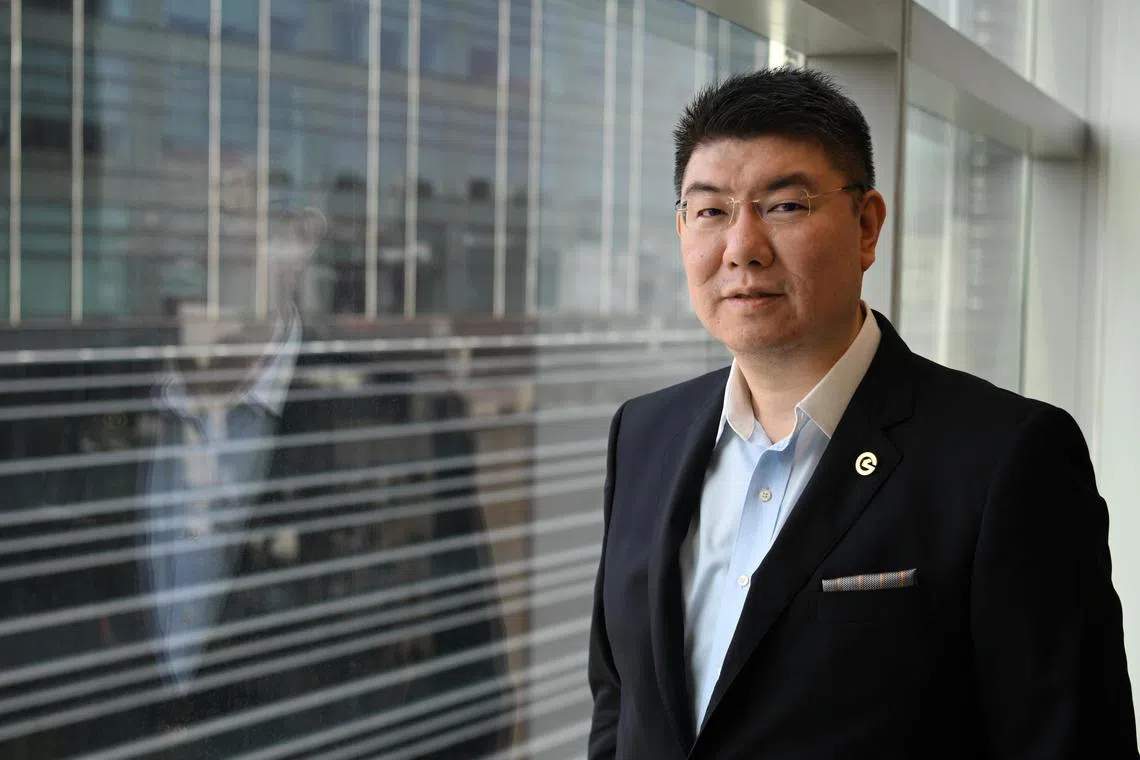Green Link Digital Bank eyes Chinese market after strong start in S’pore
Sign up now: Get ST's newsletters delivered to your inbox

GLDB chairman Geng Jing says the lender has already approved credit facilities of around $50 million to businesses.
ST PHOTO: CHONG JUN LIANG
Follow topic:
SINGAPORE - Green Link Digital Bank (GLDB), one of Singapore’s two wholesale digital banks, is setting its sights on China’s vast micro, small and medium-sized enterprise market even as it gains a foothold here.
The bank, owned by Chinese developer and state-owned enterprise Greenland Group and Hong Kong-listed supply chain financing platform Linklogis, was up and running in October after a soft launch in June.
GLDB chairman Geng Jing told The Straits Times the lender has already approved credit facilities of around $50 million to businesses. Its products include working capital loans, trade and supply chain financing, and fixed deposits.
Customers include those with generic cash and loan requirements, and firms engaged in trade between Singapore and China. They largely comprise businesses in the commodity, trade and infrastructure sectors, government suppliers, as well as high-tech companies and start-ups, he said.
GLDB won approval to open here as a digital wholesale bank in late 2020, along with peer Ant Group which unveiled its Anext Bank also in June 2022. These players can serve micro, small and medium-sized enterprises (MSMEs) and non-retail clients.
GLDB has a new chief executive, Mr Melvin Teo, who was previously DBS’ country head for China and Indonesia. He took the reins in October from Mr Goh Soon Hong, whom the bank announced as its CEO in June and who stepped down due to personal reasons, said Dr Geng.
Dr Geng said Asean is China’s largest trading partner, which gives the bank plenty of opportunities to cater to firms doing business in the region, adding that Singapore is one of the biggest economies in Asean, and a leading financial and trading hub with high digital penetration.
“Singapore is a window to others in the region and we want to continue playing a role in promoting trade flows across the region,” Dr Geng told ST on Wednesday at the bank’s office in Mapletree Business City during a week-long visit here.
GLDB currently does not plan to obtain licences in other markets. But it is not ruling out taking its services to China, where it already has a competitive edge from Greenland’s presence, he said.
The bank might set up a subsidiary in China after it grows to meet certain conditions, and if the business environment is suitable, he said.
Greenland holds a majority stake in GLDB. The group uses a supply chain platform that serves as a bridge to connect buyers and suppliers from around the world and within China.
“This forms ecosystems which not only facilitate trade but also ease the way of doing business and lower overall transactional costs,” said Dr Geng.
However, he said that Singapore is the bank’s priority.
“GLDB is incorporated in Singapore, and I would like to think that we are a Singaporean bank in essence. As we look ahead, GLDB is committed to deepening our roots in Singapore to meet the needs of our clients here,” he said.
The lender is currently supporting its expansion here by growing its workforce – largely made up of local staff – by 50 per cent to 130 people this year, hiring in areas such as risk management, compliance and business development.
GLDB lends to firms that might not have the credit history or collateral needed to borrow funds from traditional banks.
Its platform, which taps technologies such as artificial intelligence and the blockchain, allows it to collect data about these companies by tracking their role in supply chains. This gives it a more accurate picture of the firms’ revenue, profit and other financial data, said Dr Geng.
For example, it could provide a larger loan if a firm indirectly supplies goods and services to an “anchor buyer” that is an established company, he said.
The bank can also use a firm’s intellectual property as collateral, he said, adding that it provides working capital to some start-ups from the National University of Singapore’s entrepreneurial arm with mature products that are ready to be tested.
Despite its strong start, the bank will need to contend with global headwinds such as slowing economic growth and rising interest rates, which could weaken firms’ ability to repay their loans.
But Dr Geng said GLDB uses data mining and analytics to manage uncertainties, for example, by dynamically pricing its loans based on a firm’s level of risk. Its unsecured term loans are priced from 5 per cent a year while secured term loans start from 4 per cent a year, according to its website.
“Our loans might not be the cheapest (in the market) but they allow businesses to access capital when they most need to,” said Dr Geng.
He also said the bank’s current account allows customers to earn interest, unlike most offered by traditional lenders.
“In a world with rising interest rates and uncertainties, the ability to be precise in identifying trends and mitigating risk is crucial.”


